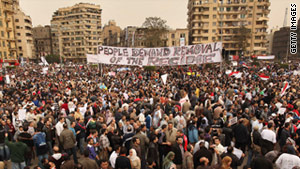The domino effect of Arab unrest
CNN.com |
By Parag Khanna
The Arab upheaval, which has been compared to the 1989 collapse of the Berlin Wall, challenges not only the regimes that are falling, but also more fundamentally the entire Arab order that has held since the decolonization of three generations ago. We are witnessing the triumph of people power over the inertia of political power.
Overpopulation and corruption are the twin scourges of almost all post-colonial countries across Africa, the Middle East, and South Asia. Tunisia, Egypt, Jordan -- and other Arab societies like Morocco, Libya, Yemen, and Syria -- are all pressed to manage global economic forces and channel them into benefits such as jobs and welfare for their citizens. Even the monarchies like Jordan and Morocco won't be considered legitimate unless they deliver the goods.
A new governance model will emerge from the wreckage of these regimes. Presidential or executive powers will be curtailed. Strongman states will diminish. Cronyism and clan-based governance will be replaced by more technocratic leadership that will answer to the people as well as to global markets. The old Arabism of anti-colonial rhetoric and failed Sunni unity will be replaced by a new Arabism led by Qatar's Al Jazeera, Lebanese bloggers, and Dubai-best investors.
It is their entrepreneurship, know-how, and capital which are re-shaping the vast young Arab generation's outlook on the world. This is the kind of fresh, young secular Arabism the West should get behind --liberating them from the squeeze between autocrats and would-be theocrats. A domino effect doesn't have to be a bad thing. Replacing autocracy with democracy and ideology with pragmatism would be a big step forward for much of the Arab world. We should welcome this ushering in of a new era.
